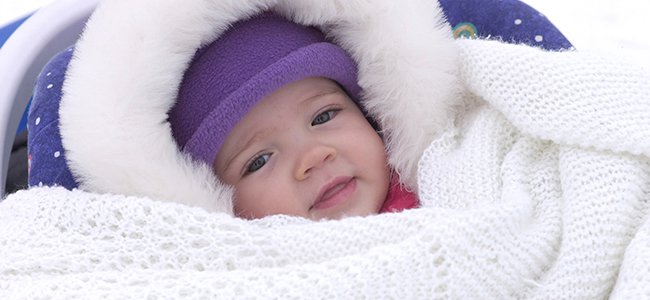4 Tips for Keeping Your Baby Warm

So you have finally brought your long-awaited child home. This is a time of joy, and a mix of many other emotions. But you may also experience a lot of worry and doubt about how to properly care for your baby and ensure their well-being. This is especially the case when our worst enemy is approaching: winter. How can you keep your baby warm?
Your child’s care can be quite a challenge. These days, it is not as simple as piling blankets on the newborn. This only opens the door to possible negative effects because it is highly counterproductive.
So, these tips for making sure your baby doesn’t get cold, will be everything you need to get through this icy season. These tips will help you make sure your baby doesn’t get sick. And best of all, that you stay in tip-top condition. Comfortable, warm and worry free.
Becoming a mother means finding strength that you didn’t know you had, and discovering fears you didn’t know existed.
-Anonymous-
Make Sure Your Baby Keeps Warm This Winter

You’re probably wondering why it is so important for your baby not to feel a little cold. First, consider that for newborns, their body’s internal thermostat doesn’t work yet. This prevents them from regulating their own body temperature, which means it can vary quite a lot.
This means that we have to pay attention and make sure the child is not too cold or hot. This all happens because your child doesn’t have any body fat yet. This is why they are more likely to feel cold. However, there are other factors that make them more sensitive to cold.
For example, as you know, their skin is very thin and delicate. The ratio of their weight and body size is much higher than that of adults. This has an influence when it comes to maintaining a lower body temperature.
Also, remember that your little one still eats very little. So the production of heat through food is unlikely to occur. Once again, your baby’s body temperature usually tends to decrease.
4 Tips For Keeping Your Baby Warm
Just as we mentioned, solving this problem for your child doesn’t mean piling blankets on them, or keeping them locked indoors. Here are 4 tips that will help make sure that your baby does not get too cold. Say goodbye to maternal fears and childhood illnesses!
I feed you, I care for you, I protect you. But with your smile, you do more for me than I do for you.
-Anonymous-

- Knowing how to take their temperature is key. You don’t need to live these first few months with a thermometer in hand, and traumatize your little one. It is about knowing what part of the body to touch in order to check if it feels cold or hot. Their neck, arms, legs and chest will be your best indicators. Under no circumstances should you check their temperature with their hands and feet, because – due to the immaturity of their blood system – these will always feel cold to you.
- Onions, as a fashion inspiration, are the solution to all your problems, meaning that your choice of clothing is critical during your child’s first months. It is not only about choosing thick clothes. But to properly combine different layers of clothing. The idea is to make sure they are wearing at least one more item of clothing than you are. This way, if the child is hot, you can remove a layer. Also, do not forget to put a hat on them to cover their head.
- There is nothing better than a warm, relaxing bath. It is important to keep the water at about 96.8° F, which is the same as the temperature inside the mother’s womb and suggested by neonatologists. Make sure his clothes are ready and the bathroom is not too chilly so as not to subject your baby to a sudden change in temperature. The bath should last between 3 and 5 minutes. Dry their body and quickly dress them afterwards to maintain their body heat.
- Control the temperature in the areas the child spends the most time in. It is essential that the temperature in these places is at least 75ºF. If you use electric heating, never leave the radiator near your child’s crib, as this can also affect their health. It is important to make sure their space is ventilated, and open windows daily to allow air to circulate. This prevents the drafts from reaching your baby, which can make them catch a cold.
So you have finally brought your long-awaited child home. This is a time of joy, and a mix of many other emotions. But you may also experience a lot of worry and doubt about how to properly care for your baby and ensure their well-being. This is especially the case when our worst enemy is approaching: winter. How can you keep your baby warm?
Your child’s care can be quite a challenge. These days, it is not as simple as piling blankets on the newborn. This only opens the door to possible negative effects because it is highly counterproductive.
So, these tips for making sure your baby doesn’t get cold, will be everything you need to get through this icy season. These tips will help you make sure your baby doesn’t get sick. And best of all, that you stay in tip-top condition. Comfortable, warm and worry free.
Becoming a mother means finding strength that you didn’t know you had, and discovering fears you didn’t know existed.
-Anonymous-
Make Sure Your Baby Keeps Warm This Winter

You’re probably wondering why it is so important for your baby not to feel a little cold. First, consider that for newborns, their body’s internal thermostat doesn’t work yet. This prevents them from regulating their own body temperature, which means it can vary quite a lot.
This means that we have to pay attention and make sure the child is not too cold or hot. This all happens because your child doesn’t have any body fat yet. This is why they are more likely to feel cold. However, there are other factors that make them more sensitive to cold.
For example, as you know, their skin is very thin and delicate. The ratio of their weight and body size is much higher than that of adults. This has an influence when it comes to maintaining a lower body temperature.
Also, remember that your little one still eats very little. So the production of heat through food is unlikely to occur. Once again, your baby’s body temperature usually tends to decrease.
4 Tips For Keeping Your Baby Warm
Just as we mentioned, solving this problem for your child doesn’t mean piling blankets on them, or keeping them locked indoors. Here are 4 tips that will help make sure that your baby does not get too cold. Say goodbye to maternal fears and childhood illnesses!
I feed you, I care for you, I protect you. But with your smile, you do more for me than I do for you.
-Anonymous-

- Knowing how to take their temperature is key. You don’t need to live these first few months with a thermometer in hand, and traumatize your little one. It is about knowing what part of the body to touch in order to check if it feels cold or hot. Their neck, arms, legs and chest will be your best indicators. Under no circumstances should you check their temperature with their hands and feet, because – due to the immaturity of their blood system – these will always feel cold to you.
- Onions, as a fashion inspiration, are the solution to all your problems, meaning that your choice of clothing is critical during your child’s first months. It is not only about choosing thick clothes. But to properly combine different layers of clothing. The idea is to make sure they are wearing at least one more item of clothing than you are. This way, if the child is hot, you can remove a layer. Also, do not forget to put a hat on them to cover their head.
- There is nothing better than a warm, relaxing bath. It is important to keep the water at about 96.8° F, which is the same as the temperature inside the mother’s womb and suggested by neonatologists. Make sure his clothes are ready and the bathroom is not too chilly so as not to subject your baby to a sudden change in temperature. The bath should last between 3 and 5 minutes. Dry their body and quickly dress them afterwards to maintain their body heat.
- Control the temperature in the areas the child spends the most time in. It is essential that the temperature in these places is at least 75ºF. If you use electric heating, never leave the radiator near your child’s crib, as this can also affect their health. It is important to make sure their space is ventilated, and open windows daily to allow air to circulate. This prevents the drafts from reaching your baby, which can make them catch a cold.
This text is provided for informational purposes only and does not replace consultation with a professional. If in doubt, consult your specialist.








